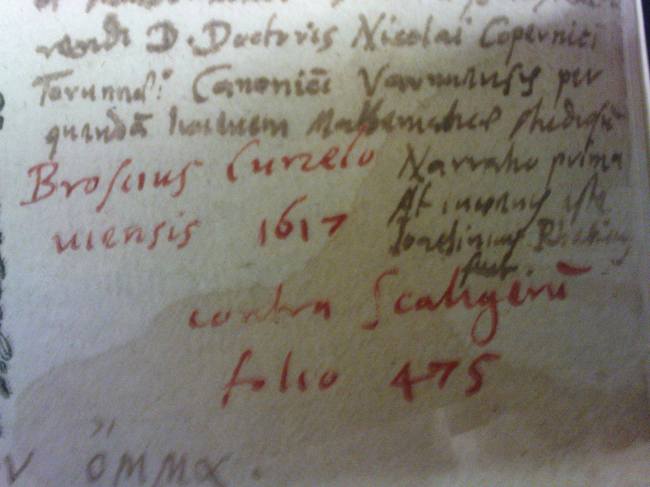Every decent chronology has, or at least should have, its beginning and what one should expect from a project dedicated to the discussions on chronology and calendar reform in late medieval and early modern Central Europe is to have its own chronological backbone. In my case, however, it is difficult to give a precise terminus a quo that would define the beginning of my interest in these matters. It was the spring of 2012 when I was working on the final version my doctorate on Ramist rhetoric and its reception in Polish-Lithuanian commonwealth which I wrote at the Chair of Old Polish Literature of the Faculty of Polish Studies, Jagiellonian University in Kraków. I was leafing through the pages of volumes that belonged to a Krakow-based seventeenth-century scholar, Jan Brożek (Joannes Broscius, 1585-1652) who is probably the only Polish scholar who wrote a separate treatise addressed explicitly against Ramism, especially against the Ramist vision of geometry. I was working on the image of Ramus in Broscius’s Apology of Aristotle and Euclid against Peter Ramus and others of 1652, trying to reconstruct at once his views on Ramist method in general and geometry in particular and his scholarly workshop as such, when I noticed for the first time that a large number of notes left by Broscius in his volumes is related to such issues as the reform of calendar, coexistence of Gregorian and Julian calendar in Poland and Lithuania, and to the comparative chronology. All these notes lead me to two brochures he had published in Kraków and Warsaw in 1641 in which he tried to convince the Uniates to accept the Gregorian calendar. His creative process related to the problems of calendric astronomy seemed to me far more attractive, especially at the exhausting final stage of work on my ‘Ramist’ dissertation and, frankly, for few weeks I completely neglected writing about figures of speech, early modern scholars and disciples reading Ramist textbooks and even Broscius’s anti-Ramist Apology, trying to trace down calendar-related volumes that belonged to Broscius and that are still preserved in the vast and rich collection of the Jagiellonian Library in Kraków. So there is no particular date of origin when I came up with the whole idea and what I have instead is a process which lead me to this current exciting research project.
After the defence of my doctorate, I have been generously awarded a three-year research grant funded by the Polish National Science Centre (Narodowe Centrum Nauki, NCN) within the FUGA scheme for post-docs and which I am carrying out since October at the Faculty of “Artes Liberales” of the University of Warsaw. However Broscius constitutes a main point of reference, the project is not limited to his scholarly achievements in this field. It turned out that despite the fact that numerous primary sources has been recognized by scholars, mostly historians of astronomy, of previous generations, there is no narrative that would have taken together all Central-European, mostly Polish-Lithuanian, late medieval and early modern attempts to cope with the issue of calendar reform, Central-European input to the discussion on chronology as well as the regional reception of the views on these matters proposed by Western-European scholars. Over the next three years I am going to focus on such diverse primary sources as Latin manuscripts of computus, wokrs on calendar and chronology that are available both in print and in manuscript, networks of scholarly correspondence, and finally, early modern readers who were trying to understand these issues.
This blog is conceived as a kind of a field notebook or collection of miscellaneous materials related to the project. You may expect some longer posts on particular issues I will be dealing with, shorter posts on my progress, photos of primary sources, especially the manuscript ones. Just another blog written by an early modernist, one could say, but I hope that despite the immense proliferation of the early modern corner of the academic blogosphere and information overload we all experience nowadays, you will add this page to your RSS reader and decide to have a look at the next posts.
Just as I cannot give you the exact date when the idea of this project was born, I cannot give you either the exact date when Jan Brożek started to think about the calendars. I really like to think, however, that it happened somewhere in 1617, when he bought a copy of the third edition of Copernicus’s De revolutionibus, i.e. Astronomia instaurata libris sex comprehensa, the Amsterdam edition with Nicholaus Müller’s commentary. In it, on the title page, he wrote down his name and a laconic reference to page 475, where he found some arguments against Joseph Justus Scaliger, one of the intellectual titans of the second half of the sixteenth to whom we owe much of the early modern chronological and calendric fever. I believe the image below makes a fabulous epitome of what is yet to come within the next years.
Astronomia instaurata libri sex comprehensa, qui de Revolutionibus orbiumcoelestium inscribuntur […], Amstelodami: Wilhelmus Jansonius Blaeu, 1617; title page of Broscius’s working copy, Jagiellonian Library, Kraków, shelfmark: Mag. St. Dr. 311204 II
Photo: Jakub Niedźwiedź

